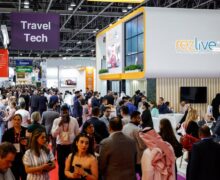Accessibility for the physically-challenged is a challenge for the MICE industry

Destinations in Asia should improve their accessibility for physically-challenged participants of business events, urged speakers at last week’s BE@Penang 2018 conference.
Ajit Singh Sikand, president and CEO of HBC Luxury MICE Consulting, noted that physically-challenged persons “have been excluded” from most business events although they “want to be as independent as other delegates – to be able to move around freely (in hotels, convention centres and airports), with signs and infrastructure that allow them to do so”.
He opined that presently there was little being done by hotel companies, convention centres and destinations, especially for the visually-impaired. As for wheelchair users, some measures have been taken by suppliers to cater to them.
Another speaker, Calum Di Lieto, editor of C&IT UK, quoted latest findings from a State of the Industry Report, saying that one of the top five qualities meeting planners look for when determining a destination was accessibility.
Di Lieto explained that accessibility in this case meant the readiness of the destination to meet the needs of physically-challenged participants.
Most of the time, destinations are not ready, according to Rahul Bharadwaj, director technology & operations, of Malaysia-based PCO Anderes Fourdy.
For instance, the PCO handled the Rare Disease Asia Conference in 2016 in Kuala Lumpur, where out of the 500 attendees – comprising companies working on rare disease medical solutions, doctors and the patients – were some 100 wheelchair users.
The annual conference has always been held in Singapore where the association is based, and it was the first time it was held outside of the city state.
Rahul shared: “Malaysia was picked as it was accessible by bus. For us, the challenge was to find and get hotels and venues ready for these delegates with special needs – such as the setting up of ramps for wheelchair users to get up onto stage, have the hotel remove some furniture to allow guests to move around more easily, and modify the seats on vans.”
He added that the company had also made a bid for a few association meetings from Europe with blind participants, but lost it to France because there were no hotels in Malaysia that had braille signs for its facilities and on room doors. Moreover, no hotel or convention centre in Malaysia allowed guide dogs indoors.
Because of this, Rahul said his company has stopped bidding for them as Malaysia was still not ready, despite the meetings occurring annually.
Rahul said the tourism board bureaus or venues should be the one to resolve such issues, as they have the resources to do so.
Ajit suggested that the “community, government, and cities” take the lead in starting the conversation.
“They also need to (enact laws) so that planes, airports and trains are made easily accessible for physically-challenged travellers,” Ajit added.
To do this, industry leaders agree that proper education is required.
Nichapa Yoswee, senior vice president business of Thailand Convention & Exhibition Bureau, said awareness of this need is rising every year, which is a good sign.
She acknowledged that “it is impossible for venue owners to change all at once” and said that it was just as important that “everyone is talking about it” and “know how to move forward”.
This conversation came on the heels of the unveiling of the Universal Accessibility in Meetings report, produced by BestCities Global Alliance, GainingEdge and Rehabilitation International and launched at ICCA Congress 2018 in Dubai in November.
source: TTG mice




